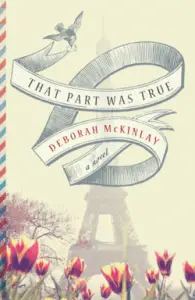That Part Was True
Deborah McKinlay
Grand Central Publishing
Release Date: February 4, 2014
ISBN 978-1-4555-7365-3
You know, I wasn’t going to finish reading Deborah McKinlay’s new novel, That Part Was True, after the first fifty pages or so. It wasn’t that it wasn’t well written – except for a few beginning passages where I wasn’t sure who was talking or how much time had passed between breaks, it was. But I wasn’t all that engaged in what had been, to that point, mostly an establishment of the main characters. I had a hard time identifying with them; they were privileged, idle, not bound by responsibility or obligation. They had ocean views and country cottages with gardens, with people who cleaned for them, as well as gardeners and chefs. They had Campari and pheasant casserole for lunch, even if the sauce “needs work” and was “a bit wintery” for a June lunch.
But even at the onset, the characters, albeit with their unfamiliar elegance, were not pretentious or churlish, and it seemed as if I would be able to read this fairly slim volume rather quickly, so I persevered.
I’m very glad I did.
At its heart, That Part Was True is about self-discovery. Not necessarily “ah-ha” moments of self-discovery, but a learning to move in the moment and see it for more than what has happened in the past; to not necessarily change direction, but to be open to change even if it is incremental, even within the framework of what is known and possibly almost too comfortable.
Jackson “Jack” Cooper is a successful American author of popular novels; he also loves to cook. When the novel opens, he is nearing 50 and learning to cope with the absence of his wife of seven years, who has recently left him for another woman. Across the ocean, Eve Petworth is a meek, middle-aged British divorcee who loves books, and lives a somewhat solitary life following the relatively sudden death of her overbearing, abrasive mother. Eve also loves to cook, especially family recipes utilizing ingredients found in and around her elegant house in the British countryside. Eve’s 27 year old daughter, Izzy, is everything Eve is not – capable, dynamic, independent – but even Izzy is showing the strain of orchestrating her upcoming wedding.
One day, on a whim, Eve is taken by a passage in one of Jack’s books, and impulsively writes him a letter:
Dear Mr Cooper,
I could probably contact you directly by e-mail, but the effort of handwriting will encourage me to choose my words carefully and I am conscious that I am writing to an author.
I wanted to tell you that I enjoyed your book, ‘Dead Letters’ very much. The scene where Harry Gordon eats the peach (‘leaning over and holding back his green silk tie with one arm while the juice christened the shirt cuff of the other’) introduced a moment of summer into a watery English day. And it reminded me, as well, of the almost decadent pleasure that comes with eating fully matured fruit – sadly, a rarity.
With best wishes,
Eve Pentworth
Jack, charmed, writes her back, and, finding out that they both entertain a fondness for cooking and for exploring new foods and techniques, they begin a correspondence that sparks a friendship.
Meanwhile, both are having to deal with challenges in their separate lives. Jack is disquieted about his apparent lack of being able to maintain a serious relationship, and his writing has suffered as he yearns to pen something more substantial than the popular novels for which he has become known. He feels his 50th birthday looming, and wonders if he’s squandered all of his best opportunities; despite the assortment of colorful and entertaining friends that wander in and out of his life, he feels adrift.
Eve is struggling with the strain between her and Izzy. Izzy had loved her grandmother “Gin-Gin” dearly, being the one person upon whom the haughty matriarch had doted. With the all the demands of pulling off the society wedding that Izzy has envisioned, she misses the strength and support of her grandmother desperately. Eve is trying to fill the vacuum that Virginia Petworth’s passing left, but she had been overlooked and left out of so much of her daughter’s life in favor of “Gin-Gin”, she’s finding even modest demands somewhat daunting. Then there’s the knowledge that the wedding will also involve her ex-husband, who left both her and Izzy without a backwards glance, that has ratcheted her anxiety level up more than a few notches – and crippling anxiety is something that has already affected Eve throughout her life, without the added stressors of Izzy’s needs and her own loneliness.
The correspondence between Jack and Eve is the one part of both their lives where there is no pressure, where there are no expectations. Their shared love of cooking and appreciation for food, both simple and refined, is an oasis of calm in two otherwise unsettled lives. As time goes on, they both begin to share with each other some of their more personal fears and hopes, and give each other much needed advice and support, sans posturing and without entanglement.
That Part Was True did indeed turn into a beautiful, tender read, delicately balancing muted action and honestly voiced introspection that refused to devolve into cloying whinery. Status and privilege faded into being merely part of the literary environment of the story, and Ms. McKinlay deftly sidestepped stereotypical character types and plotting to grace us with a touching, very human tale. I found the final chapters to be especially endearing – but I’ll leave that for you to find out for yourself. If you, like me, find the first few pages of this slender novel to be somewhat distancing, please stay with it. I’m sure that you, like me, will be very glad that you did.

